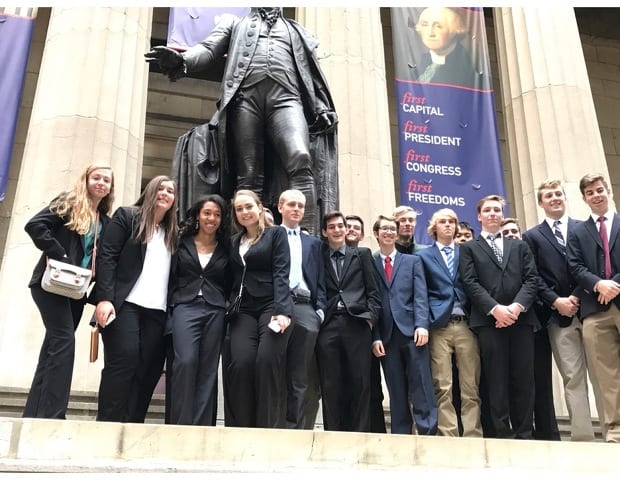STATE COLLEGE — Every other day, a group of 22 students at State College Area High School meet to discuss things such as market trends, financial news and portfolio performance.
These are not abstract discussions. The students in the Stocks and Investments 2 class run the Little Lion Fund are actively managing $80,000 of real money, entrusted to them by 45 investors from the community. It’s a responsibility these students take seriously.
“We are managing other people’s money, and that’s such a tangible thing,” said senior Jackie Feffer. “It’s a lot of pressure, but it’s the good kind of pressure that you can really excel with.”
Course instructor Jennifer Miller set up the fund as an investment club in 2012, modeling it after the Nittany Lion Fund at Penn State, with the intention of providing a real world experience for high school students interested in finance.
The class is structured so that every student has a job, whether as an analyst for a specific stock, manager for one of the fund’s six sectors (consumer discretionary, consumer staples, information technology, health care, energy and industrials), accountant, economist, promotions manager, communications manager, chief investment officer or president.
According to chief investment officer Nick Vanden, a senior, it is crucial that every person in the class takes his or her role in the class seriously.
“It takes a lot of preparation outside of class,” he said. “It’s important that everyone does the work so things run smoothly, because if people come in unprepared, it will really bog down our meetings.
“You have to be driven, and you also have to have an opinion and not be afraid to share it. When everyone speaks up and gives their opinion, we can make stronger decisions.”
Miller agreed. “In this class, you have to be able to defend yourself. There have been so many times the entire class was leaning toward making a decision, and one person stood up and said, ‘I think you are all wrong, and this is why,’ and changed the whole mindset of everyone. If you’re not willing to do that, it’s not going to work.”
The whole class must vote before a stock is traded, but the investors get the final say.
“Every decision the students make has to be approved by the investors,” Miller said. “After the class votes on a particular buy or sell decision, an email goes out to all investors and they have 24 hours to respond with either a ‘yes’ or a ‘no.’
“At the end of the school year, every investor is invited to a presentation where the students present their portfolio. We review the year, and we talk about good decisions that we made, bad decisions that we made and our rationale for the things we did, whether they were right or wrong.”
Over the years, the fund has frequently outperformed the S&P, Miller said. She does not vote or overrule any class decisions, but she does encourage the students to be as active as possible in their decision-making.
“I always tell them, ‘Hope is not a strategy.’ You can’t just wait things out, you have to think them through,” she said.
Several Little Lion Fund alumni have gone on to work on Wall Street, Miller said, and she takes the current class to tour the financial district in New York City every year.
“This year we were able to visit a former Little Lion Fund member at Goldman Sachs, and last year we were able to visit two — one at Bank of America Merrill Lynch, and one at Citigroup,” she said. “Those have been incredible experiences. We’ve been able to go onto a trading floor and see what it looks like, talk to different people in different jobs and get a big picture of what people do in an investment bank.”
While getting involved in the Little Lion Fund is clearly a good idea for students interested in pursuing a career in finance, the students predict that the experience will benefit them regardless of their eventual career path.
“This class helps you learn so many things about working with a team, having good discussions — because sometimes there are conflicts about what stocks to buy and sell — and just learning how to talk to other people,” said Feffer, who plans to attend Harvard to major in economics and minor in Spanish. “The class becomes fun and interesting when you want to be a part of the process. You don’t necessarily have to want to go into finance; it’s so interesting regardless.”
Vanden, who plans to major in accounting, added, “Being involved in this for two years, I’ve learned a lot of cool stuff that not every high school student gets to learn, stuff that will help me in college. I’ve been able to do real world accounting for a real life mutual fund. It’s not just something you read in a textbook. It’s a really unique opportunity.”
The fund is looking for more investors from the community, Miller said. Potential Little Lion Fund investors can contact her at jsm23@scasd.org.
“This is a very interesting, easy way for community members to feel like they’re part of educating students,” she said. “Our investors are providing students with a really unique opportunity to learn in a real world way.”




